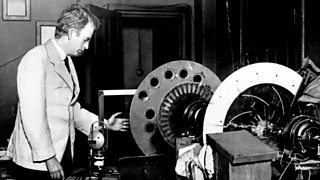
The brains behind the Industrial Revolution
A key factor in the Industrial Revolution was knowledge. Britain’s political system encouraged scientific thought and freedom to try out scientific and business ideas.
Coal and steam are easy factors to identify in the Industrial Revolution but brains were another key factor. Eminent scientists like Sir Isaac Newton and Robert Boyle had made important discoveries about gravity, and the behaviour of gases. These discoveries were harnessed and turned into business ideas by men like James Watt and his business partner Matthew Boulton. Britain’s political system aided these developments. Compared to most European states, the British Parliament held very little control over the economy, preferring to leave businessmen to run businesses rather than interfering.
At the same time, there was very little censorship or control of ideas and publications, so ideas could be circulated and developed. In London, scientists met and discussed ideas at the Royal Society. In the Midlands, the Lunar Society did much the same. Many scientists were interested in knowledge for its own sake, but there were others who were able to turn these ideas into new technologies to make fortunes too.
Duration:
This clip is from
Featured in...
![]()
Scottish inventions and discoveries—Βι¶ΉΤΌΕΔ Scotland
A look at some of the great Scots and their world-famous inventions and discoveries.
More clips from Why the Industrial Revolution Happened Here - Learning Zone
-
![]()
Why did Britain need a better road network?
Duration: 03:01
-
![]()
The transport revolution - Britain’s canal network
Duration: 03:52
-
![]()
The importance of coal in the Industrial Revolution
Duration: 02:52
-
![]()
The growth of industry and factory towns in Britain
Duration: 03:56






